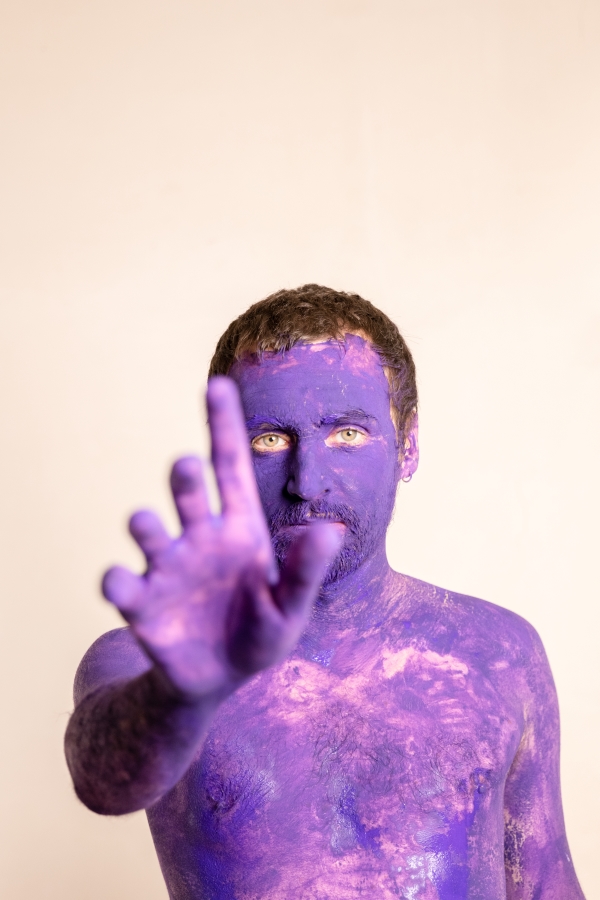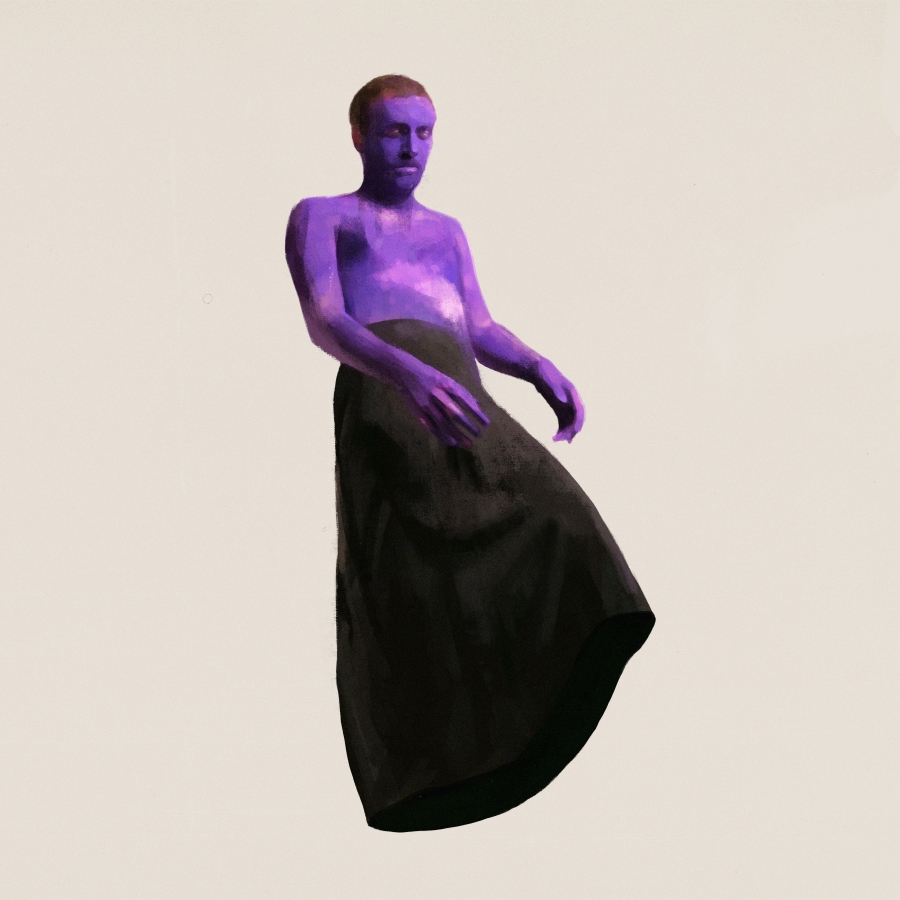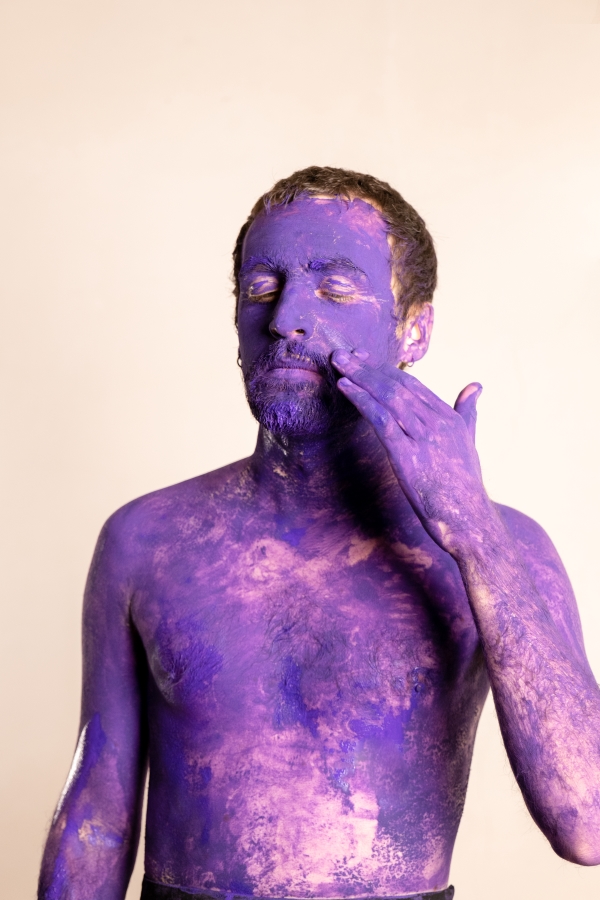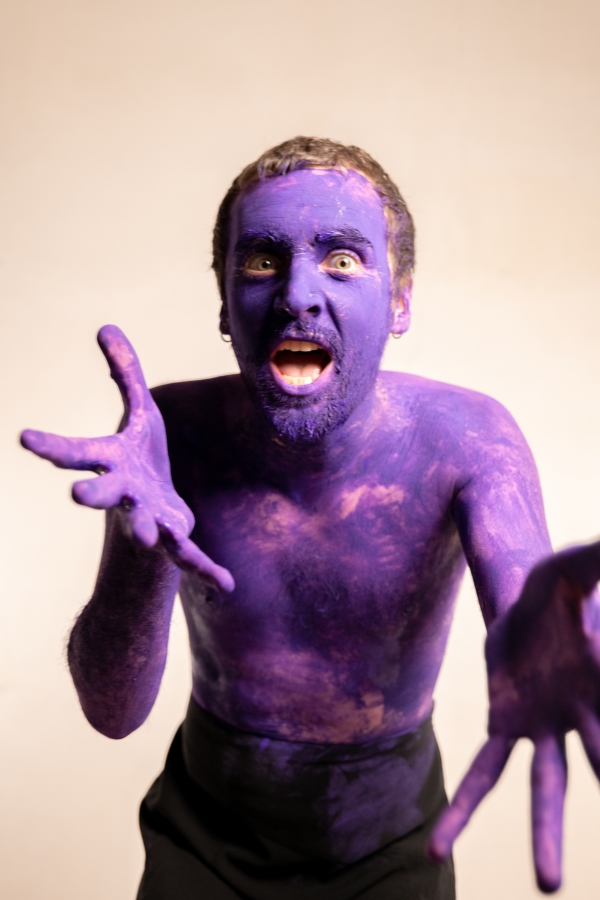The Anglo-Italian performer tells his story through voice, body and ritual, taking us inside his music made of languages, poetry and rituals.
BEERCOCK is a singer, musician, poet and theatre actor. In 2017 he released his first album “Wollow“, followed by two years of touring between Italy and the UK in radio, clubs, theatres and festivals. As a performer, he also works in various theatre collectives as a director: his soundtracks and shows debuted in Italy at Santarcangelo Festival and Primavera dei Teatri. His second album “Human Rites“, released in 2020, marks the beginning of a new artistic phase that starts with the concept “Voce. Body. Rite“. Voice and body become the privileged instruments to explore the ancestral, the ritual, the individual and choral singing.
In November 2021 VoceCorpoRito was published by Bisso Edizioni, a collection of texts that through the language of poetry tells the story of birth and development of Human Rites, not only as a record but as a creative process and narrative between Beercock and the world around him.
Last August we had the chance to interview him and find out more about Sergio Beercock‘s artistic path and talent.

Who is Beercock?
Hi! It’s me, who I’ve always been since I was little. It’s my surname, my real surname. Initially he was a child who clapped his hands rhythmically on dad’s shoulder during his lullaby. Then he liked drawing, a lot, then he discovered heavy metal music and became a drummer in his teens; then he discovered that he liked to sing and he sang. Meanwhile he discovered the theater when he was 16/17, and started working in it and now it’s all these things. He has stopped dividing himself between the musician, the actor, the performer, the writer… I am everything I do, what I feel the need to do.
So Beercock went from being an individual to being a person, so a social presence. Because I like to think that what I do is not only expressing myself and being an artist; but since I look around a lot, I hang out with people, I hang out a lot with people outside the artistic sphere. I work a lot in the social field with immigration, with childhood, and I like to think that what I then bring to the stage is what I pull from my social life, from my personal life; and when I mean a social life I don’t mean a worldly life, with that I still have some difficulties after the first lockdown. So one could say, in the huge quantity of things I like to do, and feel I have to do, it turns out that Beercock is a musical and theatrical performer.
Why did you choose to sing in English and above all why did you choose to make this record entirely linked to you in every sense?
I chose to sing in English because I didn’t actually choose it. I grew up with English-speaking music having an English dad who raised me on bread and Stevie Wonder. All this music played in the car and in the living room as I ran across the carpet. So inevitably I sing in English, because the music from the mouth, from the body comes out like this, that is the music of singing for me. Although over the years I have begun to approach other languages too, little to institutional Italian, much to regional Italian, to Sicilian, although I don’t write in Sicilian, to South American Spanish because I like to listen to it and I am also very excited to sing it, although I don’t speak it.
And therefore the choice of English is simply a natural progression of listening, of absorption; the elaboration and then the expression … the pulling out. Then I always say that I don’t sing, I am sung in turn by something that crosses me, and that language is English. Why make a record like this? You say tied to me. In reality it is not strictly related to me, or rather, it is a record that I played all on myself, almost completely with my body and voice. The beats, the choruses, are all done completely with the samples of my body, if not even played live. So yes, it might sound self-referential as an approach, but everything I write and play I always think it in the multitude.
And a record of the kind that we have chosen, perhaps out of a profound sense of loneliness and a need to make this feeling community. I could have made this record with a real choir, I could have made this record with body percussionists, but I was alone. In the recording room, with the mask. So I said: “Ok. We have to find a way to multiply this Sergio indefinitely and make a Sergio choir that can abstractly represent a choir of people. “How nice would it be to be able to do it with a choir of people?” And so I made a virtue of necessity, nothing else.

Consequently, after these choices Human Rites was born. Apart from this need to seek the community in being alone for reasons independent of your choice, but unfortunately imposed by an emergency that none of us expected, what has changed in your approach to writing and sound research? Because by doing a job entirely related to finding the sounds on your body you have certainly done a different job compared to your first record.
Yes. I removed. Compared to the first album and compared to how I generally worked with music, I stopped judging myself and judging my body aesthetically. I have always had reservations about my body, who knows for what very distant trauma of adolescence. The fact is that I thought that in a period like this I had only and only myself, I could not access all the tools and all things as I would have liked to access and at the same time I liked to think that it was time to trust myself as an actor too. Not to think that you need lights, big sets, a huge stage, a nine-piece band.
The idea was to have something to say, an almost eschatological urgency, I had to get this thing out. These things to say that I had been holding for a very long time, and we were ready to make this record and then a world calamity. And I wanted, I had a tremendous need for people, I was ready to touch them again. So let’s fucking do it, and let’s do it with nothing. A ritual totally human, completely and absolutely a human ritual.
That it doesn’t need artifice, fireworks… it doesn’t need painting, graphics, computers, it doesn’t need anything. It just needs a man who has something to say and people who can hear him say it instead of him… that this is theater. Through a space I act instead of you watching me do it. It is a form of mirror, a form of martyrdom scholars would say, but a very luminous martyrdom. So although I am not spiritual, a religious, I like to think, it helps me and makes me feel good to think, that this discipline and this method can be the most concrete way to access the body of others.
What are the future projects and what will be the evolution of Human Rites?
Human Rites has evolved, has flourished beyond the record, already when it came out. Because of my enormous fortune, and also for the choice of Beercock’s project, and of the identity of my project and therefore of my person, it immediately became something else. It was already clear from the start that it wasn’t going to be a record to carry around with concerts, although it can be done. It could be a very traditional concert of live-sampled electronic music. But it bores me to think of a canonical concert. I always like to think about pushing barriers, crossing them, tripping over them, banging my face and even bleeding. But that’s okay, it turns me on, excites me, always keeps me alive, the terror of doing something that could go wrong.
As a result Human Rites is no longer a record, but has become a way of doing things. A way of composing music on stage for other shows, not just mine. I often find myself using my live sampling machines to transform the sounds and gestures that the actors make on stage into music; thus if a clap arrives, a note arrives, a voice, a scream, everything enters in the mechanism of the loop and becomes a beat, a chorus … a chorus in the theatrical sense. So I can say that Human Rites, also because of the concept that gives birth to it, that is “Voice, Body, Rite“, has become, I repeat, a way of doing things.
Then the future projects and the present projects are basically: theatrical performances for which I take care of the live soundtracks, which I compose together with the actors from time to time. Even in some shows we do it literally from time to time, we don’t prepare anything beforehand, I don’t send samples. We do everything improvised live. The next short-term projects will be: a performance of Human Rites, the release of a book that will be called: “Voice, Body, Rite“, about the way I made the album. There will be thoughts… It is basically a collection of poems; a long poem that has the need for collectivity as a theme.
Then a whole series of theatrical performances of Italian and foreign productions that are adopting Human Rites as a way of making music on stage.


